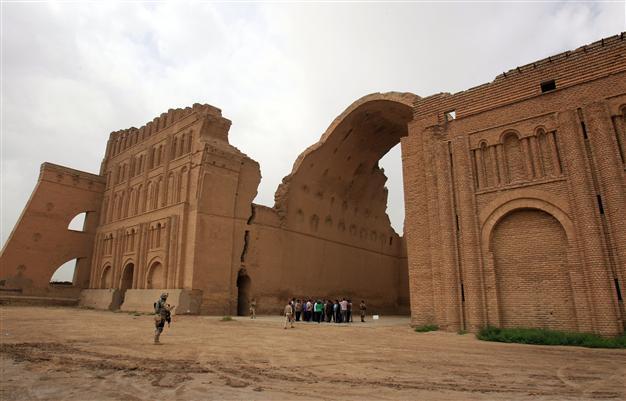Iraq to restore ancient arch to woo back tourists
MADAIN, Iraq - Agence France-Presse

Iraqis stand under the arch of the barrel-vaulted hall of the Ctesiphon palace, which was in the imperial capital of the Persian Empire in the Parthian and Sassanian times, near Madean, 30 kilometres south of Baghdad, on May 15, 2013. AFP Photo
Iraqi authorities have contracted a Czech firm to carry out a 10-month restoration of the ancient Arch of Ctesiphon as part of a plan to boost tourism to the once-popular site.Through the decades of conflict that have wracked Iraq, the famed 6th century monument, which is the world's largest brick-built arch and the last structure still standing from the ancient Persian imperial capital Ctesiphon, has fallen into disrepair.
A massive slab fell off late last year as a result of damp caused by heavy rains.
It lies south of Baghdad, just a short distance from the tomb of Salman Pak, one of the companions of the Prophet Mohammed.
Together, the two sites form what was once one of Iraq's main tourist attractions in the town of Madain.
But decades of unrest have badly hit what was once a thriving part of the country.
The town was suspected of housing a biological weapons reasearch facility under the regime of dictator Saddam Hussein and, after his 2003 ouster and subsequent execution, it became an Al-Qaeda stronghold.
Efforts to revive its reputation as a tourism hub have proceeded in fits and starts.
Now, Czech company Everis has been brought in to restore the arch, also known as Taq-i Kisra from its Persian name, in a first step to revive the town's economy.
"We began our work here a short while ago, carrying out studies on the site," said the firm's Iraq manager Imad Abu Aqlam, adding that surveys are expected to be completed next month.
"The restoration process requires about 10 months -- that includes securing the bases of the site, treating the damp, and supporting Taq-i Kisra to ensure that no parts fall off it in the future." The firm hopes the project will help the area to recover some of its lost glory.
Construction of the Arch began in 540 AD during the Persian Sassanid dynasty's long wars with the Byzantine Empire.
It formed part of a palace complex started three centuries earlier and, at 37 metres (122 feet) tall and 48 metres (158 feet) long, is the largest brick-built arch in the world.
It lies about two kilometres (1.2 miles) from the tomb of Salman Pak, who was originally Zoroastrian but converted to Christianity, and was later sold into slavery to a Jewish family in Medina in present-day Saudi Arabia, before converting to Islam.
Before the US-led invasion of 2003, the area boasted gardens and arbores, as well as a popular museum.
But now there is little foliage because the irrigation pipes were destroyed and the trees were cut down for firewood, while the museum was looted after Saddam's overthrow.
In 2004, the Global Heritage Fund said that, as a result of disrepair, the arch was "in danger of collapse".
Those warnings proved prophetic -- late last year, a slab about two-metres (six feet) in length fell off.
"Taq-i-Kisra was neglected for a long time -- for four decades -- and we decided to rehabilitate it when the piece fell down at the end of last year because of the rains," said Madain's director of antiquities, Abdulhadi Hassan.
"That raised our fears and concerns about this historic site." Officials hope a restoration of the arch will revive Madain as a tourist destination, but for now, the area is closed off to visitors, with prior approval required for anyone wanting to take a look.
The arch itself is currently still surrounded by concertina wire and cement walls, separating it from the nearby orchards, and authorities have no firm timeline on when they hope to reopen it to the public.
"That depends on the progress of the work," Tourism and Antiquities Minister Liwaa Smaisim told AFP.
"We need good infrastructure here to reopen this place for all the people, and inshallah (God willing), that will be done as soon as possible."
















